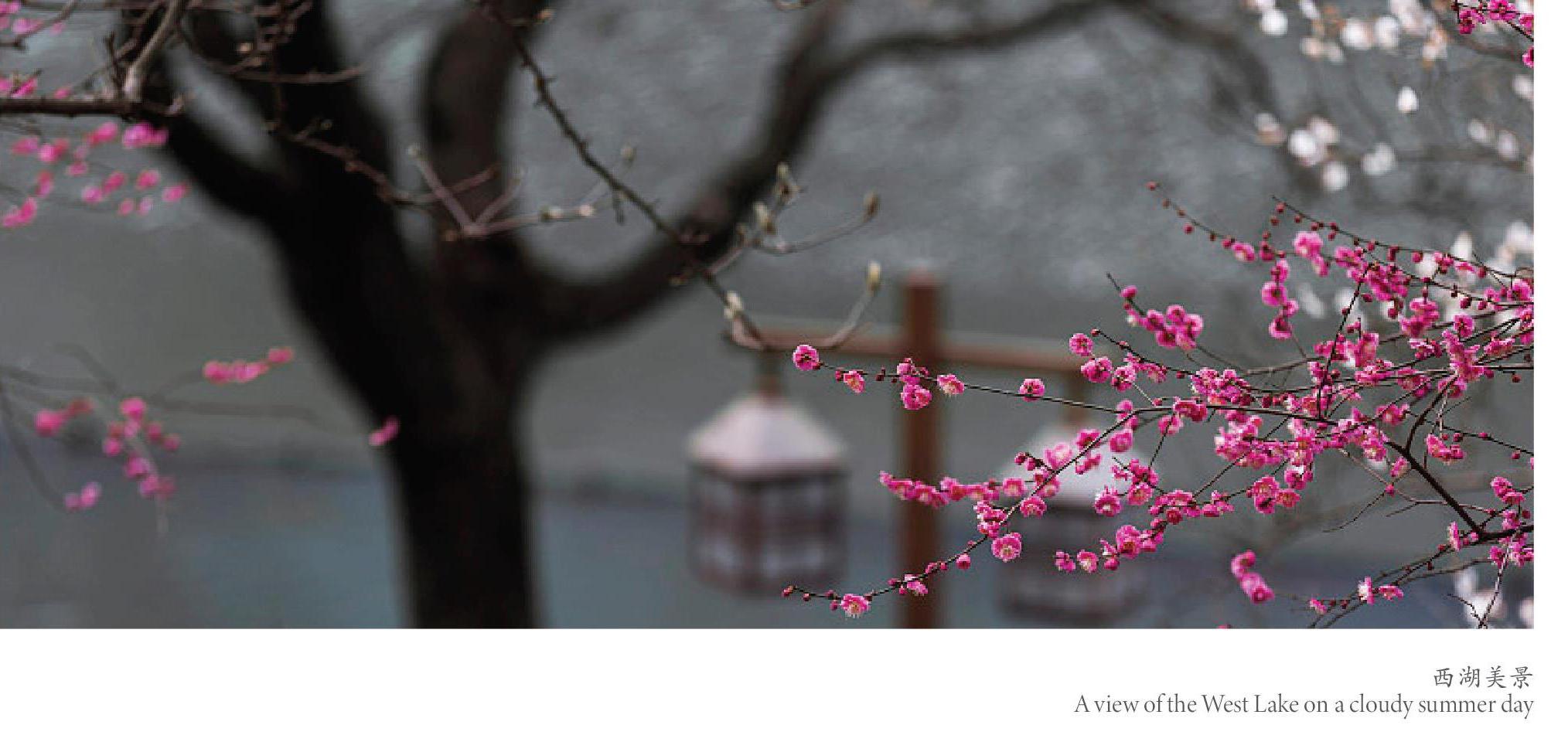天下梅花看孤山
2021-03-26



又到江南赏梅时。说到赏梅,杭州孤山的梅花特别出名。
梅不是特别难栽种的植物,因而天下梅花盛开之地多了去了。为什么说杭州孤山的梅花特别出名呢?因为有诗、有故事。这当中,首屈一指的当然是北宋林逋(林和靖)“梅妻鹤子”的故事,还有他的诗《山园小梅二首》。
其实,在林和靖之前,杭州的“老市长”白居易就已经给孤山的梅花作了“推广”,有诗《忆杭州梅花因叙旧游寄萧协律》为证:
三年闲闷在余杭,曾为梅花醉几场。
伍相庙边繁似雪,孤山园里丽如妆。
蹋随游骑心长惜,折赠佳人手亦香。
赏自初开直至落,欢因小饮便成狂。
薛刘相次埋新垄,沈谢双飞出故乡。
歌伴酒徒零散尽,唯残头白老萧郎。
在这首诗里,白居易追忆当年在杭州“曾为梅花醉几场”的赏梅趣事,特别点出了赏梅的去处——“孤山园里丽如妆”。他曾将梅花作为珍貴礼物赠送给佳人,也曾因梅花凋落后被游客的马蹄践踏而感到惋惜。他赏梅“赏自初开直至落”,对梅花可谓一往情深。
由此可见唐代孤山梅树已有相当规模,所以有“梅花屿”之称。隋唐以来孤山屡建寺庙,清朝时还建有行宫,都离不开植物的点缀,千百年来,孤山的梅花也就这样传承了下来。
孤山梅花的传承,功劳最大的当然是林逋了。据传他四十岁后隐居在孤山,有二十多年没有跨进杭州城。他喜欢种梅树,又喜欢养鹤,“以梅为妻,以鹤为子”,终生不做官也不娶妻。他的《山园小梅二首》被称为咏梅绝唱:
(其一)
众芳摇落独暄妍,占尽风情向小园。
疏影横斜水清浅,暗香浮动月黄昏。
霜禽欲下先偷眼,粉蝶如知合断魂。
幸有微吟可相狎,不须檀板共金尊。
(其二)
剪绡零碎点酥乾,向背稀稠画亦难。
日薄从甘春至晚,霜深应怯夜来寒。
澄鲜祇共邻僧惜,冷落犹嫌俗客看。
忆着江南旧行路,酒旗斜拂堕吟鞍。
暄妍,形容梅花明媚艳丽。疏影横斜,梅花疏疏落落,枝干斜横投在水中的影子。暗香浮动,梅花散发的清香。绡,生丝绸。吟鞍,吟诗者的马鞍。
第一首诗的大意为,百花凋零后,只有梅花独自绽放。艳丽的梅花吸引了人们的目光,是小小庭院中的亮点。清清的水面上映照出梅花和枝干稀疏的倒影。月光下,风中飘来阵阵梅花散发的清香。白色的鸟也会停在梅枝上偷偷地欣赏梅花,如果蝴蝶看到这艳丽的梅花,也许会嫉妒得死去。既然我可以吟诗与梅花亲近,也就不需要歌唱,当然也不必饮酒了。
第二首诗的大意为,梅花似剪碎的丝绸,点缀着酥酪般的枝干,即使这样也很难画出梅花的高雅姿态。虽然在这春天的傍晚,我可以尽情地享受夕阳西照的美景,却又担忧梅花在早春夜寒里,被浓浓的霜覆盖。明媚鲜艳而又孤傲的梅花只与相邻的高僧惺惺相惜,一般人不懂得欣赏梅花的冷落和孤傲。想起从前行走在江南的时候,我一边骑马吟诗一边欣赏酒旗下飘落的点点梅花。
诗人突出了梅花风霜高洁的品性,以梅花比喻自己孤高的品性和隐逸的生活情趣。全诗不细写梅花形状,着意写梅花的神韵,其实是在透过梅花抒写自己的人格。
也有传说,林逋之所以二十多年一直隐居西湖孤山,以梅为妻,以鹤为子,是因为一段情。读他的《相思令·吴山青》,似乎有点儿这方面的意思:
吴山青,越山青。
两岸青山相送迎,争忍有离情?
君泪盈,妾泪盈。
罗带同心结未成,江头潮已平。
究竟如何,已不可考。若果然如此,林逋真可谓“天下第一情种”。
流传于孤山梅花之中的还有冯小青的悲剧爱情故事。据传,明万历年间(1573—1620),十六岁的扬州人冯小青因故流落杭州,在元宵赏灯时与冯生一见钟情,甘愿为妾,因冯生原配夫人容不下她,她只得离开冯家,后来迁居在孤山梅花屿,“命画师画像,自奠而卒”,年仅十八岁。从此,她就长眠于孤山梅花树下,留下了凄美的诗:
新妆竟与画图争,知是昭阳第几名?
瘦影自临春水照,卿须怜我我怜卿。
又有诗云:
春衫血泪点轻纱,吹入林逋处士家。
岭上梅花三百树,一时应变杜鹃花。
历来文人吟咏孤山梅花的诗词很多。
南宋周密(1232—1298),字公谨,号草窗,吴兴(今浙江湖州)人,南宋德祐间曾任义乌令,南宋亡后隐居,著有《齐东野语》《武林旧事》等。关于孤山梅花,他写有《木兰花慢·断桥残雪》:
觅梅花信息,拥吟袖,暮鞭寒。
自放鹤人归,月香水影,诗冷孤山。等闲。
泮寒晛暖,看融城、御水到人间。
瓦陇竹根更好,柳边小驻游鞍。
琅玕,半倚云湾。孤棹晚、载诗还。
是醉魂醒处,画桥第二,奁月初三。东阑。
有人步玉,怪冰泥、沁湿锦鹓斑。
还见晴波涨绿,谢池梦草相关。
泮,冰雪融化。晛(xiàn),阳气浮动。锦鹓,饰有鸟的锦制女鞋。鹓,传说中与凤凰同类的鸟。
此词大意为,我低声吟咏,就是为了寻找梅花的信息,在暮色苍茫中,紧掩双袖,仍然觉得非常寒冷,连手上的马鞭都寒气逼人。自从放鹤的林和靖仙逝以后,西湖的孤山就冷藏着他的咏梅诗句。总有一天会阳光灿烂,所有的冰雪都会消融,到那时候,杭州满城春色,伴随碧绿的春水来到人间。残雪虽然短暂,但在碧瓦陇中、竹根篱边、垂柳边,还是可以欣赏到的。布满浓云的水湾,岸上翠竹的身影在风中摇摆。暮色中,有一叶扁舟归来,满载着诗情。我醉眼朦胧,寻找回家的路,看到这里有画桥,还有透明的湖水之上漂着的船。美人珠玉般的话语声从东边的花园里传来,雪消失后的浅泥溅湿了她们锦鞋上美丽的绣图。眼前的蓝天碧水,也许就是谢灵运梦中的春草池塘吧,我听到了园林里鸟儿欢快的鸣叫声。
此詞将诗、雪、梅融为一体,突出了词人对孤山残雪的喜爱。
明代王思任(1574—1616),字季重,山阴(今浙江绍兴)人,写有《孤山》:
淡水浓山画里开,无船不署好楼台。
春当花月人如戏,烟入湖灯声乱催。
万事贤愚同一醉,百年修短未须哀。
只怜逋老栖孤鹤,寂寞寒篱几树梅。
此诗不但凭吊林和靖,而且有向往他与梅、鹤相伴过隐居生活的意思。
明代张岱(1597—1679),字宗子,山阴(今浙江绍兴)人,写有《林和靖墓柱铭》:
云出无心,谁放林间双鹤。
月明有意,即思冢上孤梅。
此铭联对仗工整,纪事倒也适合墓柱。
明代徐渭(1521—1593),字文长,号天池山人,山阴(今浙江绍兴)人,写有《孤山玩月》,略长,辑录两句:
暇时吐高怀,四座尽倾听。
却言处士疏,徒抱梅花咏。
徐渭遥想林和靖当年月下咏梅,高朋满座,似乎夸张了,隐居之人恐怕不会招客满堂如此热闹的。
明代卓敬(?—1402),字惟恭,瑞安(今浙江瑞安)人,写有《孤山种梅》:
风流东阁题诗客,潇洒西湖处士家。
雪冷江深无梦到,自锄明月种梅花。
卓敬的联想似乎不太说得通,有谁会半夜三更在野外种花种树的?
明代王稚登(1535—1612),字百谷,写有《赠林纯卿卜居孤山》:
藏书湖上屋三间,松映轩窗竹映关。
引鹤过桥看雪去,送僧归寺带云还。
轻红荔子家千里,疏影梅花水一湾。
和靖高风今已远,后人犹得住孤山。
卜居孤山的林纯卿不知是不是林和靖的后人,也没有考证过。不过,在此诗中,王稚登是把林纯卿当作林和靖的后人的。
明代陈鹤(1516—1560),字鸣野,写有《题孤山林隐君祠》:
孤山春欲半,犹及见梅花。
笑踏王孙草,闲寻处士家。
尘心莹水镜,野服映山霞。
岩壑长如此,荣名岂足夸。
陈鹤的这首诗读来就没有那么沉重了,又是“笑踏王孙草”,又是“闲寻处士家”,悠闲得很。
清代陈锡嘏(1634—1687),字介眉,号怡庭,写有《送汤西崖归西泠》:
马蹄经岁踏京华,忽逐征鸿去路赊。
何物关心归思急,孤山开遍早梅花。
陈介眉思念孤山的梅花,虽身不能至西泠桥边,心早已向往着开遍梅花的孤山了。有诗相伴,孤山梅花确实与众不同了。
(作者系杭州市政协智库专家、杭州文史专家)
Plum Blossoms and the Solitary Hill in Hangzhou
With springtime setting in, it is the plum blossoms season again. In Hangzhou, the plum scenery in the lakeside Solitary Hill is second to none, taking into consideration all the literature, tales and legends related to the island with bridges connected to the lake banks. The best-known cultural figure is Northern Song literati Lin Hejing (967-1028), whose life story is crystallized in his alias "meiqi hezi", ("plum tree as wife and cranes as children"). The poet settled down in the hill to withdraw from society at the age of 40 and never left, living in solitude with the company of only plum trees and cranes. In his life in Hangzhou, he never set his foot in the city proper. Lin's most quoted verse lines are as follows:
"Dappled shadows hang aslant over clear shallow water; Secret fragrance wafts in the moonlit dusk."
In the eye of Lin Hejing, plum blossoms burst forth after all the other flowers faded into freezing cold, and thusly became the crown jewel of winter and "even made butterflies jealous".
"It takes a truly noble mind to appreciate the pride of the flowers. With the blossoms at the doorstep, I don't need any entertainment."
A lesser-known literal reference is a poem by Bai Juyi (772-846), written before Lin Hejing's most famous "plum blossoms" duet. In the poem, the Tang poet reminisced about his three years serving his duties as governor of Hangzhou and recalled how the company of his two friends and the plum blossoms healed his restless soul:
"I still remember the drinking sprees enjoyed in the intoxicating beauty of the plum blossoms in those three dull years...From the first day of the blossoming season, I couldn't take my eyes off the scene, until the last flower withered and fell..."
The poem, together with many others, also reveal why the Solitary Hill in Hangzhou was also called "Plum Islet". The plum scene of the hill was also continuously enriched by bustling religious activities throughout Sui (581-617) and Tang (618-907) years and the construction of a temporary imperial residence up in the hill in the Qing Dynasty (1644-1911).
Love is also one of the themes of the many legends and tales related to the seasonal beauty of the Solitary Hill.
More speculative sources claim Lin Hejing chose to live in seclusion after his heart was broken in a failed love. Another love tragedy is about Feng Xiaoqing, living in the Wanli years of the Ming Dynasty (1368-1644). Legend has it that the 16-year-old girl from Yangzhou fell in love with a man she met in Hangzhou. The romance of the two came to nothing because of the man's jealous wife. The suicidal girl left the man and rested in peace under the plum trees in the Solitary Hill.
The fans of the plum blossoms of the Solitary Hill also include Zhou Mi (1232-1298), born in present-day Huzhou. The Southern Song loyalist lived a hermit's life in his later years. One of his poems shows his obsession in the thawing snow scene of the Broken Bridge in Hangzhou.
"Riding a horse and chanting in the freezing cold of dusk, I was searching for the message of plum flowers. Someday, the snow will thaw and the sun will come out again, and the city will be bathed in the sweetness of spring...I saw a rowboat return in hazy twilight, fully loaded with poetic sentiments. Bleary-eyed, I headed home, feasting my eyes on beautiful waters and boats and overhearing the girls' small talks from the back yards in the east...The scene felt just like what Xie Lingyun saw in his dreams..."In one of his poems titled "Solitary Hill", Ming Dynasty poet Wang Siren (1574-1616) expressed his respect for Lin Hejing and his yearnings for a hermit's life just like Lin's.
Zhang Dai (1597-1679), an outstanding representative of the Ming Dynasty man of letters, was such a big fan of Lin Hejing that he wrote what he claimed to be an epitaph for the man.
A special member in Lin's fan club is Xu Wei (1521-1593). The self-willed, wayward Ming dynasty painter, poet, writer and dramatist indulged in a dazed and self-destructive lifestyle till his last day. In one of his poems, he depicted the imaginary scene of himself and Lin Hejing sitting under the moonlit plum trees and surrounded by a houseful of friends and guests.
The poems of Ming Dynasty poet Zhuo Jing, born in present-day Rui'an in Wenzhou, show the man's romanticism and imagination went a bit too far. In one of his poems, he depicted an unlikely scene of someone planting plum trees at midnight in the formidable cold of the West Lake.
For the Ming Dynasty poet Chen He (1516-1560), the plum blossoms of the Solitary Hill brought more relaxed joy than melancholy and loneliness, as shown in one of his verses dedicated to the hill's floral beauty.
The plum blossoms of the hill enchanted Chen Xigu (1634-1687) so much that the man recalled the scene with genuine affection many years after he left Hangzhou.
